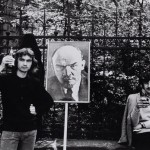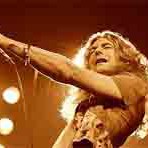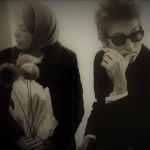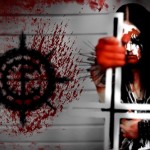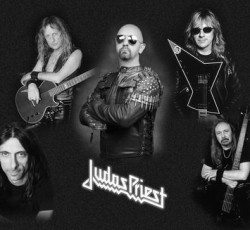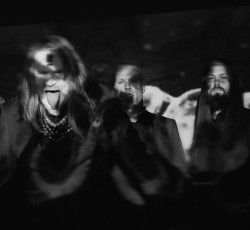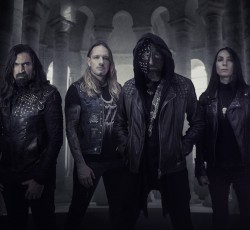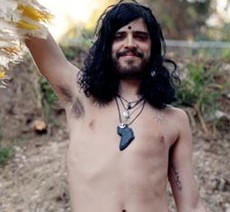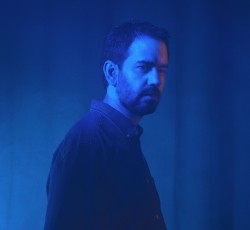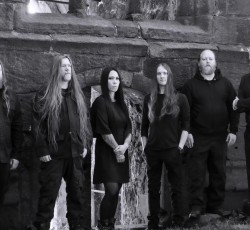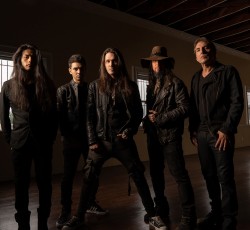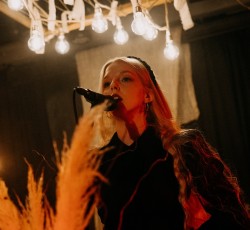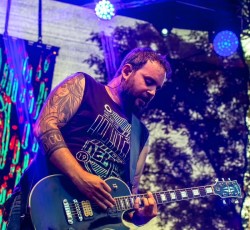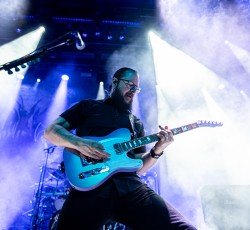Alan Parsons interview: "I think that the producer is to make the artist shine in their own way. I would be worried if I had too much of a mark on somebody else's record"
14/09/2012 @ 11:34
There is no need for special occasions in order for us to speak with Alan Parsons, the man who as sound engineer has worked with The Beatles and Pink Floyd and as a musician succeeded with his own Alan Parsons Project. However, the cooperation with Electric Litany has given us the chance to discuss with the experienced producer what the production of a record means to him, how he sees music both in general and with the Alan Parsons Project. Somewhere along these lines we learned unknown details about his concert in Greece in 2004 and his non-cooperation with Pink Floyd for the recent reissues.
How was the first approach between you and Electric Litany made and afterwards you decided to start working on this project?
Well, you are a website so you can understand. The contact was actually made through the internet, Electric Litany visited my website, I liked their approach and I heard their music and I thought that this is something really different. I contacted them and we made a call on Skype. Actually everything happened very quickly and I am really looking forward to work with them. But we have yet to meet; we have actually met only by Skype calls.
But it was nice that it was a personal contact between you, with no managers involved.
Yes, they are of course working very closely with Maria, their manager. They are all based in London as you may know, two Greek guys and two British. They are very dedicated and determined and they are doing all they can to make it happen.
 And what was it that you heard in their music that made you accept the project? What element did you notice?
And what was it that you heard in their music that made you accept the project? What element did you notice?
Actually the songs were brilliant, wonderful music. I haven’t heard anything like it before. So I am just really excited to have my input in what they are doing. I am of course very honoured and flattered that they would consider me as their producer and especially being their first choice.
Most people when they listen about a 'record producer' what they actually have in mind is the 'sound engineer' who is only interfering with the sounds. Is that all that a record producer actually does, and especially you? Do you get involved in the actual creative process?
I think I am a little more traditional engineer and producer than other people that are doing this job these days. Traditional means that I concentrate on the songs and the music and the engineering is done with my technique and sound balance, whereas now more producers are into electronics and the use hard drive discs and what we call plugins. I may be old school in that respect. I use traditional values and methods to do what I do. I don’t really touch the computer. I just have an assistant to work with that. Of course all recording is based on computers these days so I usually leave that to somebody else. I work in the way that I grew up with, just working with the sound balance and the songs and music controllers and so on.
What would you say your contribution to their songs and the finished result will be?
Well it remains to be seen, we have to discover how the chemistry works in the studio. I know that they made the first album very quickly and I am not sure if it will be that way, whether we will do it very quickly or there will be more takes. That is something we cannot possible predict until we actually work together.
 Having listened to the first album, what do you think we should expect from this second album especially in comparison to the first one?
Having listened to the first album, what do you think we should expect from this second album especially in comparison to the first one?
Again, this is something we have to develop as we work together. If the songs are really anything like the first album, even remotely as good, than I will be very happy.
But you have heard the songs they are planning to record. Or not? Don’t you have an idea of the material already and how to work with it?
You know, you can have a concept for working and when it comes to the time you are actually in the studio it could be very different. For example we may decide that everybody plays together or that we record one instrument at a time. I really don’t know yet.
Let’s go into something more general. There are some producers, for example T-Bone Burnett that actually often overshadow the artists themselves and leave their own mark, of their own personality, more clear and strong than the musicians. How do you feel about that, do you feel that this is a good way to work?
I ‘ve often been told that I have a sound and an identity that I put into other people’s records but I would be worried if I had too much of a mark on somebody else’s record. That is not very good. I think that the producer is to make the artist shine in their own way, to bring out the best in them. If I can leave my mark as well, it is fine, but I don’t want to put my stamp on the music just for the sake of it, just for other people to say "oh, that was Alan Parsons", you know. I am not so self-centered. I don’t even feel the need to be particularly accredited; I want to see that they (the artists) have success.
However, continuing my previous question, the Alan Parsons Project was intended in a way to make the producer act in music as a director would act in a movie. Meaning that he has the vision and he does most of the work and everyone else follows his vision. This was successful for the Alan Parson Project but it was not, and has not become, a general way of thinking in the music business.
I ‘ve always maintained that the expression 'record producer' is not really a very good description. It is much more akin to the role of a film director. When we started out we were always using the analogy to my role as more like Stanley Kubrick, Steven Spielberg, Martin Scorsese, you know what I mean. And that is really what it’s like, the director calls 'action' the record producer says 'record', you know.
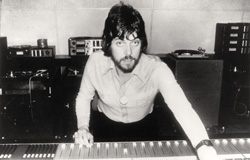 Yes, and it is always the movie of Martin Scorsese for example, not the movie of Robert De Niro, you know.
Yes, and it is always the movie of Martin Scorsese for example, not the movie of Robert De Niro, you know.
That’s right, yes. I think that at the time, although I knew I was going to be the producer of the album and I was involved in the composition, I didn’t even know if I was going to have my name on it. We actually thought that the 'star' of the first album was going to be Edgar Allan Poe, not Alan Parsons. It was really only due to the enthusiasm of the record label in Los Angeles that the expression 'The Alan Parsons Project' came along. They would talk like that for the progress of the album, you know, "how is the Alan Parsons' project going?", I had no idea at that time that it was going to be the identity of an artist. I think that what is strange with the Alan Parsons Project was that, although it had my name on it, it was a series of other artists that were actually contributing with a central character who just pulled it all together.
By the way, since you mentioned the contributing artists, was there one artist that you actually always wanted to play in one of your records but always got away for one reason or another?
I had it sorted out the Hitchcock way! I usually appear doing something. It might be a guitar part, a vocal line, the backing vocals, but I always appeared on the albums. It is funny that in recent years, probably through playing live and getting used to the idea of recording sometimes on my own, I got used to singing more. I’ve been urged to sing on some other people’s records like Lichtmond whose album is going to be out in October and the last album I put out under my own name was my own vocal performance. I’m feeling better about it now; I feel I am becoming a true singer. Maybe I’ll have a cameo just like Alfred Hitchcock.
You mentioned about touring, and I was wondering why the initial band never toured, it was not a live project. After some years you decided that the Project should go out and have concerts. What changed? I am guessing you would have proposals from the beginning.
It was a decision we took that we would be a recording act, not a live one, but partly due to budget restrictions, we couldn’t afford to have an orchestra with us. Those times were quite primitive in a sense, in the pre-midi era. Now all keyboards talk to each other you can create your sound, back in 1970 you couldn’t do that. In order to create the orchestral sound with synthesizers back then it would have taken a room full of keyboards. So when we did eventually go and played live I felt that the keyboards sounds were adequately recallable. Now we have played tours that are quite extensive which with the right budget are affordable. At the beginning we thought "no, we are not going to play live, we are just going to make the best recordings possible".
 Do you ever regret that?
Do you ever regret that?
Oh, terribly! I know that if we had played live we could have been as big as any of the big acts like Genesis or Yes or anyone. We could have done quite a lot more business. There is no question, live shows sold records. Of course, nowadays, with the twinkling sales of the records, playing live is the only way to make money. The only way I am making money, at least.
You were one of the first, if not THE first, to make a piece of music only using a computer. I think it was "Mamagamma", wasn’t it?
It wasn’t actually a computer, it was computer based instrument. At the time it was a drum machine and the Fairlight.
So how do you feel about today’s electronic music?
It usually comes down to dance music and I did try in my last studio album, "A Valid Path" to be pretty electronic and I did use very little real instrumentation with one notable exception being David Gilmour playing guitar. Otherwise it was very much in the computer. I look upon "A Valid Path" as a slightly unsuccessful experiment. It wasn’t very well received and I think that if I’m going to make another album it will be in more traditional sounds.
Are you going to make a new album?
I don’t know, I relay haven’t made plans about it. I am more excited doing production right now. I have another project coming with Steven Wilson from Porcupine Tree, his solo album. I have just finished an album for a ukulele player (Jake Shimabukuro) who became known playing "While My Guitar Gently Weeps" in Youtube. He is a brilliant musician.
Ok, now for the inevitable Pink Floyd question.
There’s always a Pink Floyd question!
Pink Floyd did this whole remastered and immersion editions of some records including the "Dark Side Of The Moon". My first question is how do you feel about the result and the second is how do you feel not participating.
I am very frustrated that they did not ask me to be involved. They asked me to be involved in the commercial and I denied that obviously. What I really wanted was to be given some kind of gesture to my contribution to the album. The remixes I did without them, the rough mixes are all mine. They have become so unbelievably rich from my work, every second of it, I just think they could have... they could have sent me a check! You know, they became unbelievably rich, I did not, I just got my payment of the week.
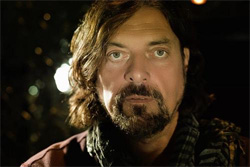 I was amazed that you were not involved in the new editions of the "Dark Side Of The Moon".
I was amazed that you were not involved in the new editions of the "Dark Side Of The Moon".
I would have liked it. It was equally or even more frustrating when they did a surround mix about 10 years ago. I didn’t even get a phone call.
I think that Alan Parsons is the second name that comes to mind when you hear the "Dark Side Of The Moon". The first is Pink Floyd of course, but you are right after that.
I appreciate you saying that but that is not the way they feel.
On a personal note, I just have to say that I was doing my military service when you were in Athens in 2004 so I still feel sorry for missing your concert.
Actually this concert was very memorable for us too because we didn’t get paid for it. We had an ongoing battle to get money for that. We got about half, the initial deposit.
Thank you very much I wish you a very successful tour.
Thank you it was a pleasure.
How was the first approach between you and Electric Litany made and afterwards you decided to start working on this project?
Well, you are a website so you can understand. The contact was actually made through the internet, Electric Litany visited my website, I liked their approach and I heard their music and I thought that this is something really different. I contacted them and we made a call on Skype. Actually everything happened very quickly and I am really looking forward to work with them. But we have yet to meet; we have actually met only by Skype calls.
But it was nice that it was a personal contact between you, with no managers involved.
Yes, they are of course working very closely with Maria, their manager. They are all based in London as you may know, two Greek guys and two British. They are very dedicated and determined and they are doing all they can to make it happen.
 And what was it that you heard in their music that made you accept the project? What element did you notice?
And what was it that you heard in their music that made you accept the project? What element did you notice?Actually the songs were brilliant, wonderful music. I haven’t heard anything like it before. So I am just really excited to have my input in what they are doing. I am of course very honoured and flattered that they would consider me as their producer and especially being their first choice.
Most people when they listen about a 'record producer' what they actually have in mind is the 'sound engineer' who is only interfering with the sounds. Is that all that a record producer actually does, and especially you? Do you get involved in the actual creative process?
I think I am a little more traditional engineer and producer than other people that are doing this job these days. Traditional means that I concentrate on the songs and the music and the engineering is done with my technique and sound balance, whereas now more producers are into electronics and the use hard drive discs and what we call plugins. I may be old school in that respect. I use traditional values and methods to do what I do. I don’t really touch the computer. I just have an assistant to work with that. Of course all recording is based on computers these days so I usually leave that to somebody else. I work in the way that I grew up with, just working with the sound balance and the songs and music controllers and so on.
What would you say your contribution to their songs and the finished result will be?
Well it remains to be seen, we have to discover how the chemistry works in the studio. I know that they made the first album very quickly and I am not sure if it will be that way, whether we will do it very quickly or there will be more takes. That is something we cannot possible predict until we actually work together.
 Having listened to the first album, what do you think we should expect from this second album especially in comparison to the first one?
Having listened to the first album, what do you think we should expect from this second album especially in comparison to the first one?Again, this is something we have to develop as we work together. If the songs are really anything like the first album, even remotely as good, than I will be very happy.
But you have heard the songs they are planning to record. Or not? Don’t you have an idea of the material already and how to work with it?
You know, you can have a concept for working and when it comes to the time you are actually in the studio it could be very different. For example we may decide that everybody plays together or that we record one instrument at a time. I really don’t know yet.
Let’s go into something more general. There are some producers, for example T-Bone Burnett that actually often overshadow the artists themselves and leave their own mark, of their own personality, more clear and strong than the musicians. How do you feel about that, do you feel that this is a good way to work?
I ‘ve often been told that I have a sound and an identity that I put into other people’s records but I would be worried if I had too much of a mark on somebody else’s record. That is not very good. I think that the producer is to make the artist shine in their own way, to bring out the best in them. If I can leave my mark as well, it is fine, but I don’t want to put my stamp on the music just for the sake of it, just for other people to say "oh, that was Alan Parsons", you know. I am not so self-centered. I don’t even feel the need to be particularly accredited; I want to see that they (the artists) have success.
However, continuing my previous question, the Alan Parsons Project was intended in a way to make the producer act in music as a director would act in a movie. Meaning that he has the vision and he does most of the work and everyone else follows his vision. This was successful for the Alan Parson Project but it was not, and has not become, a general way of thinking in the music business.
I ‘ve always maintained that the expression 'record producer' is not really a very good description. It is much more akin to the role of a film director. When we started out we were always using the analogy to my role as more like Stanley Kubrick, Steven Spielberg, Martin Scorsese, you know what I mean. And that is really what it’s like, the director calls 'action' the record producer says 'record', you know.
 Yes, and it is always the movie of Martin Scorsese for example, not the movie of Robert De Niro, you know.
Yes, and it is always the movie of Martin Scorsese for example, not the movie of Robert De Niro, you know.That’s right, yes. I think that at the time, although I knew I was going to be the producer of the album and I was involved in the composition, I didn’t even know if I was going to have my name on it. We actually thought that the 'star' of the first album was going to be Edgar Allan Poe, not Alan Parsons. It was really only due to the enthusiasm of the record label in Los Angeles that the expression 'The Alan Parsons Project' came along. They would talk like that for the progress of the album, you know, "how is the Alan Parsons' project going?", I had no idea at that time that it was going to be the identity of an artist. I think that what is strange with the Alan Parsons Project was that, although it had my name on it, it was a series of other artists that were actually contributing with a central character who just pulled it all together.
By the way, since you mentioned the contributing artists, was there one artist that you actually always wanted to play in one of your records but always got away for one reason or another?
I had it sorted out the Hitchcock way! I usually appear doing something. It might be a guitar part, a vocal line, the backing vocals, but I always appeared on the albums. It is funny that in recent years, probably through playing live and getting used to the idea of recording sometimes on my own, I got used to singing more. I’ve been urged to sing on some other people’s records like Lichtmond whose album is going to be out in October and the last album I put out under my own name was my own vocal performance. I’m feeling better about it now; I feel I am becoming a true singer. Maybe I’ll have a cameo just like Alfred Hitchcock.
You mentioned about touring, and I was wondering why the initial band never toured, it was not a live project. After some years you decided that the Project should go out and have concerts. What changed? I am guessing you would have proposals from the beginning.
It was a decision we took that we would be a recording act, not a live one, but partly due to budget restrictions, we couldn’t afford to have an orchestra with us. Those times were quite primitive in a sense, in the pre-midi era. Now all keyboards talk to each other you can create your sound, back in 1970 you couldn’t do that. In order to create the orchestral sound with synthesizers back then it would have taken a room full of keyboards. So when we did eventually go and played live I felt that the keyboards sounds were adequately recallable. Now we have played tours that are quite extensive which with the right budget are affordable. At the beginning we thought "no, we are not going to play live, we are just going to make the best recordings possible".
 Do you ever regret that?
Do you ever regret that?Oh, terribly! I know that if we had played live we could have been as big as any of the big acts like Genesis or Yes or anyone. We could have done quite a lot more business. There is no question, live shows sold records. Of course, nowadays, with the twinkling sales of the records, playing live is the only way to make money. The only way I am making money, at least.
You were one of the first, if not THE first, to make a piece of music only using a computer. I think it was "Mamagamma", wasn’t it?
It wasn’t actually a computer, it was computer based instrument. At the time it was a drum machine and the Fairlight.
So how do you feel about today’s electronic music?
It usually comes down to dance music and I did try in my last studio album, "A Valid Path" to be pretty electronic and I did use very little real instrumentation with one notable exception being David Gilmour playing guitar. Otherwise it was very much in the computer. I look upon "A Valid Path" as a slightly unsuccessful experiment. It wasn’t very well received and I think that if I’m going to make another album it will be in more traditional sounds.
Are you going to make a new album?
I don’t know, I relay haven’t made plans about it. I am more excited doing production right now. I have another project coming with Steven Wilson from Porcupine Tree, his solo album. I have just finished an album for a ukulele player (Jake Shimabukuro) who became known playing "While My Guitar Gently Weeps" in Youtube. He is a brilliant musician.
Ok, now for the inevitable Pink Floyd question.
There’s always a Pink Floyd question!
Pink Floyd did this whole remastered and immersion editions of some records including the "Dark Side Of The Moon". My first question is how do you feel about the result and the second is how do you feel not participating.
I am very frustrated that they did not ask me to be involved. They asked me to be involved in the commercial and I denied that obviously. What I really wanted was to be given some kind of gesture to my contribution to the album. The remixes I did without them, the rough mixes are all mine. They have become so unbelievably rich from my work, every second of it, I just think they could have... they could have sent me a check! You know, they became unbelievably rich, I did not, I just got my payment of the week.
 I was amazed that you were not involved in the new editions of the "Dark Side Of The Moon".
I was amazed that you were not involved in the new editions of the "Dark Side Of The Moon".I would have liked it. It was equally or even more frustrating when they did a surround mix about 10 years ago. I didn’t even get a phone call.
I think that Alan Parsons is the second name that comes to mind when you hear the "Dark Side Of The Moon". The first is Pink Floyd of course, but you are right after that.
I appreciate you saying that but that is not the way they feel.
On a personal note, I just have to say that I was doing my military service when you were in Athens in 2004 so I still feel sorry for missing your concert.
Actually this concert was very memorable for us too because we didn’t get paid for it. We had an ongoing battle to get money for that. We got about half, the initial deposit.
Thank you very much I wish you a very successful tour.
Thank you it was a pleasure.


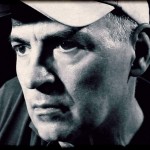




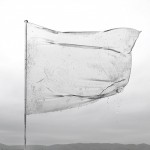



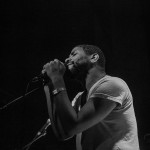
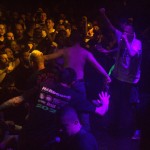


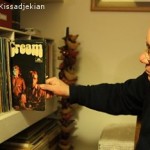
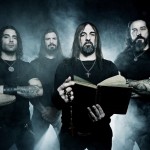

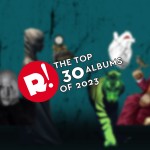
![[7]: Sons Of Anarchy: Η Αρχή Του Τέλους](https://images.rocking.gr/cine/2014/150x150/sonsofanarchy-cover.jpg)
